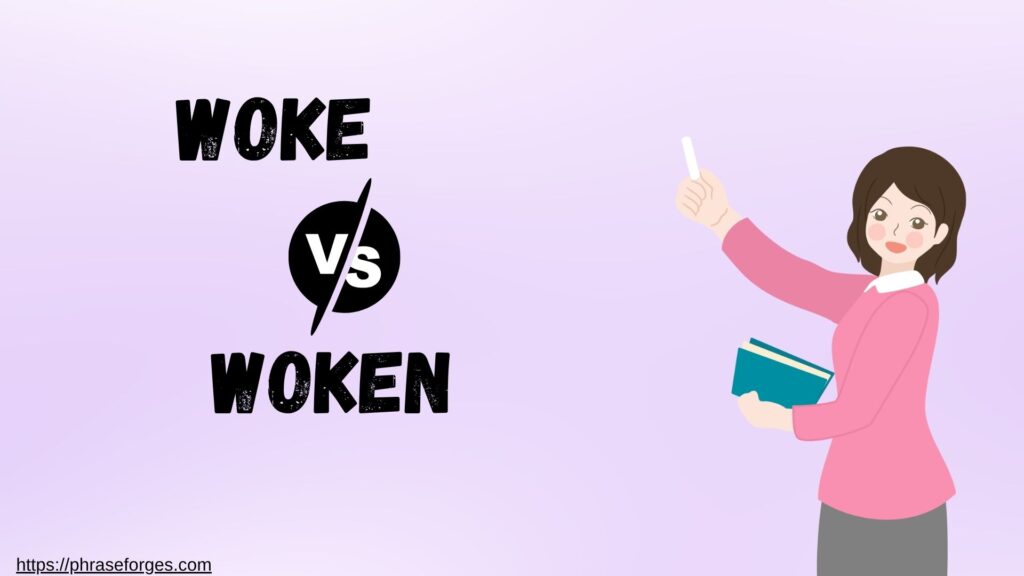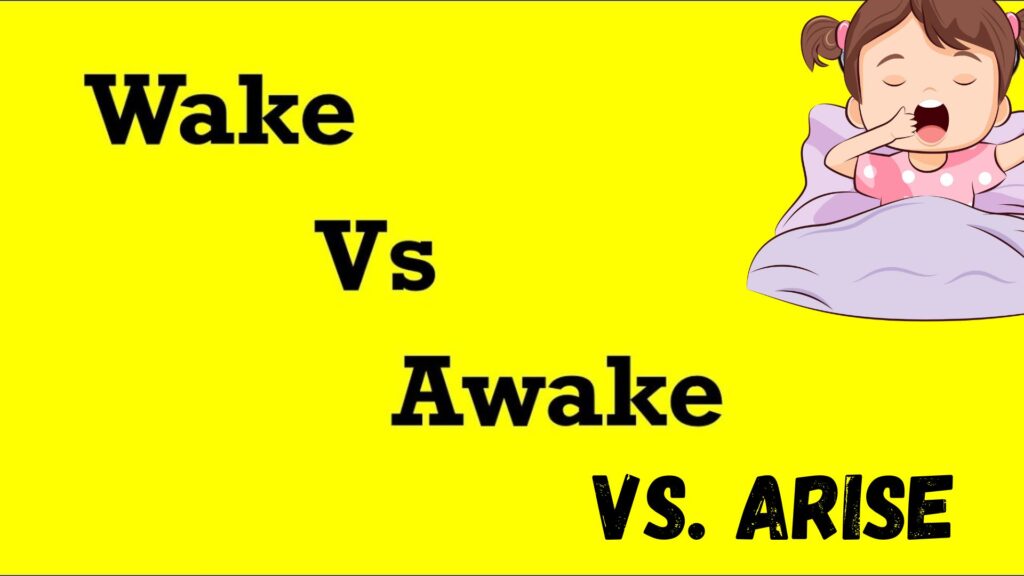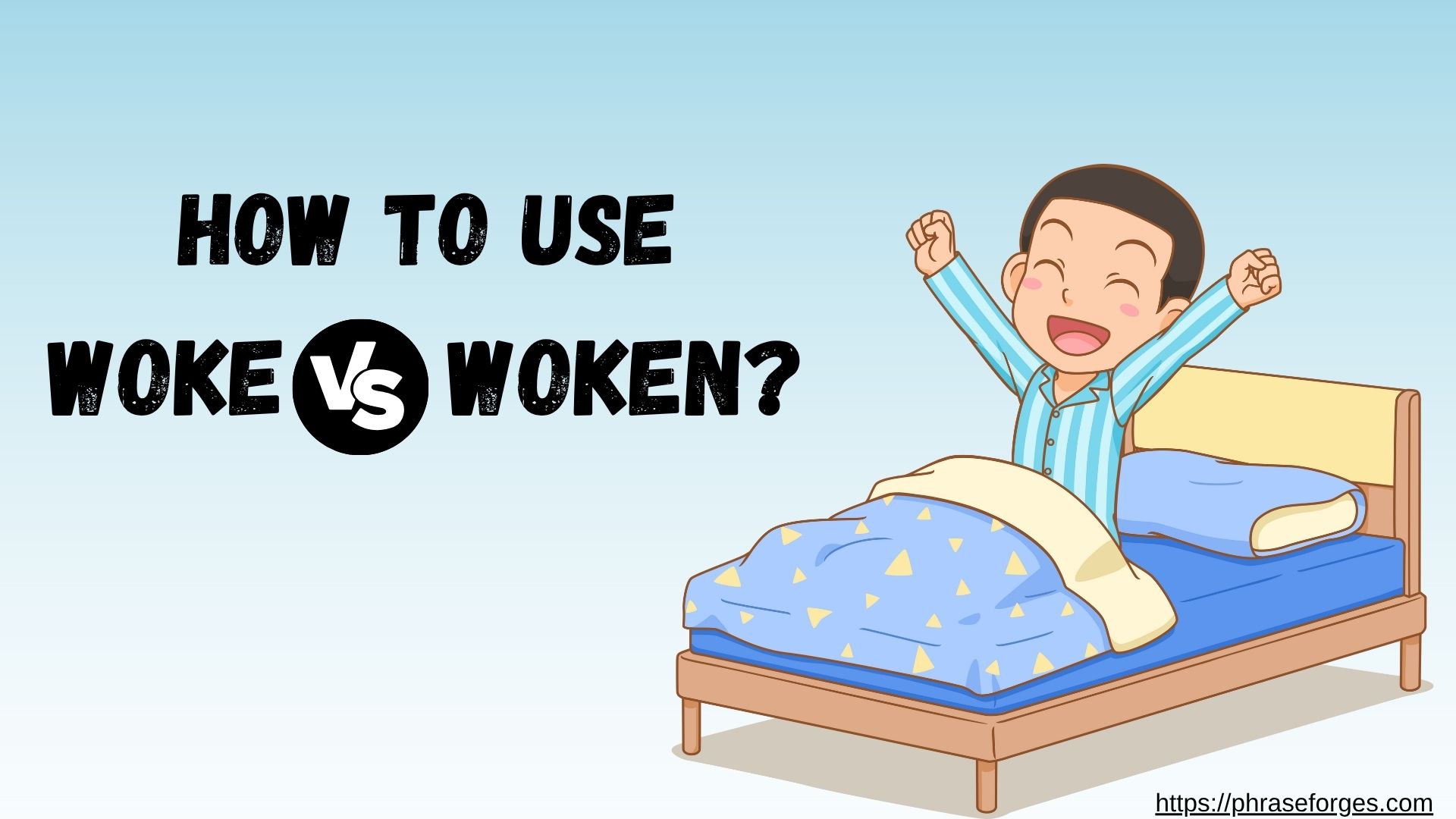Let’s face it English verb conjugation can be a bit of a headache, especially when you’re dealing with irregular verbs like wake, woke, and woken. If you’ve ever paused mid-sentence wondering, “Wait… is it ‘I had woke up’ or ‘had woken up’?” you’re not alone.
This guide will clear up the confusion with clear explanations, relatable examples (including emails!), and easy-to-remember rules. By the end, you’ll know when to use woke vs. woken without second-guessing yourself.
✅ Keyword + Intro Explanation

“How to use woke vs. woken” is one of the most searched grammar queries for learners and native speakers alike. Why? Because wake is an irregular verb which means it doesn’t follow the usual “-ed” past tense rule.
Let’s break it down.
🔍 Simple Definition + Usage Overview
The verb “wake” means:
- “To come out of sleep”
- “To become alert or conscious”
- “To cause someone else to wake up”
Now here’s where people trip up:
| Verb Form | Correct Usage |
|---|---|
| Base form | wake |
| Simple past tense | woke |
| Past participle | woken |
| Present participle | waking |
| Third person | wakes |
👉 Woke is used for simple past tense.
👉 Woken is used as the past participle, usually with an auxiliary verb like “have,” “had,” or “was.”
🔁 Clear Rules & Patterns
Use woke when:
- You’re talking about something that happened in the past, and there’s no helper verb. ✅ Yesterday, I woke up at 6 a.m.
Use woken when:
- You’re using have, has, or had part of perfect tenses. ✅ She had woken up before the storm started.
📌 Bulleted Rules with Do’s/Don’ts
✅ Do Use “Woke” for Simple Past
- I woke up late today.
- He woke the baby by slamming the door.
✅ Do Use “Woken” for Perfect Tense
- I have woken up earlier lately.
- They had woken by the time the alarm rang.
❌ Don’t Say:
- I had woke up early.
- She have woke up already.
✉️ Scenario Example: Email Correction
Subject: Schedule Change Confirmation
Hi Marcus,
Just confirming that you’ll be joining the 7 a.m. meeting. I know it’s early! I had woke up at 5 a.m. today myself rough morning!
See you soon,
—Diana
🚫 Oops!
“Had woke” is incorrect.
✅ Correct version:
I had woken up at 5 a.m. today myself.
📘 Multiple Example Sentences
| Tense/Structure | Example |
|---|---|
| Simple Past | I woke up late this morning. |
| Present Perfect | She has woken up early every day this week. |
| Past Perfect | He had woken up before the thunderstorm. |
| Future Perfect | By 8 a.m., they will have woken up. |
| Present Continuous | I am waking up slowly today. |
| Perfect Continuous | We have been waking up earlier for yoga. |
🧠 Common Mistakes & Fixes
Let’s highlight the top mix-ups and how to fix them.
❌ Incorrect:
- She had woke up late again.
- I have woke up early.
- They have been woke up by the alarm.
✅ Correct:
- She had woken up late again.
- I have woken up early.
- They have been woken up by the alarm.
Remember: If you see a helping verb (have/has/had), you probably need woken.
🛠️ Quick Reference Table
| Verb Form | Use Case | Example |
|---|---|---|
| wake (base) | Present/future | I wake early every day. |
| woke (simple past) | Past events | He woke up at noon yesterday. |
| woken (past participle) | Perfect tenses | They had woken up before dawn. |
| waking (participle) | Continuous forms | She is waking the baby now. |
🤓 Verb Structure & Grammar Concepts
When you use woken, you’re dealing with past participles. These require:
- Auxiliary verbs (had, have, has)
- Grammatical agreement between subject and verb
- Understanding of tense formation
In contrast, woke stands alone it’s a complete verb on its own in simple past tense.
⚡️ Before/After Examples in Everyday and Formal Contexts
📲 Text Message
Before: I had woke up already.
After: I had woken up already.
📝 Business Report
Before: The system woke after the outage.
After: The system was woken after the outage.
🗣️ Conversation
“I woken up at 7!” → 🚫 Sounds off
“I woke up at 7!” → ✅ Now we’re talking
💬 Slang, Idioms, and Expressions with Wake
Not everything about woke and woken is literal. Let’s explore other meanings:
| Expression | Meaning | Example |
|---|---|---|
| woke (slang) | Politically/socially aware | She’s very woke about environmental issues. |
| wake up and smell the coffee | Realize the truth | It’s time to wake up and smell the coffee about debt. |
| a wake-up call | Warning to change behavior | That warning was a wake-up call for management. |
| in the wake of | Following an event | In the wake of the scandal, the CEO resigned. |
| leave in one’s wake | Leave consequences behind | He left chaos in his wake when he quit suddenly. |
🔄 Wake vs. Awake vs. Arise

These are close cousins but not twins:
| Verb | Meaning | Example |
|---|---|---|
| wake | Come out of sleep | I wake at 6 a.m. |
| awake | Be alert or aware (slightly formal) | I am awake now. |
| arise | To get up or emerge (more abstract) | Problems may arise anytime. |
Use wake for regular sleeping contexts. Use awake for being alert. Use arise for situations or issues.
🔚 Final Thoughts: Mastering the Wake Verb
To summarize the difference between woke and woken:
- Use “woke” when there’s no helper verb and you’re describing the past.
- Use “woken” when there is a helper verb (had, have, has, etc.) especially in perfect tenses.
Once you know the rule, it’s easy to spot mistakes. So next time someone says, “I had woke up early,” you’ll know exactly what to say “You mean you had woken up early.” 😉
Keep practicing with real-life writing texts, emails, reports and you’ll use these forms instinctively.

